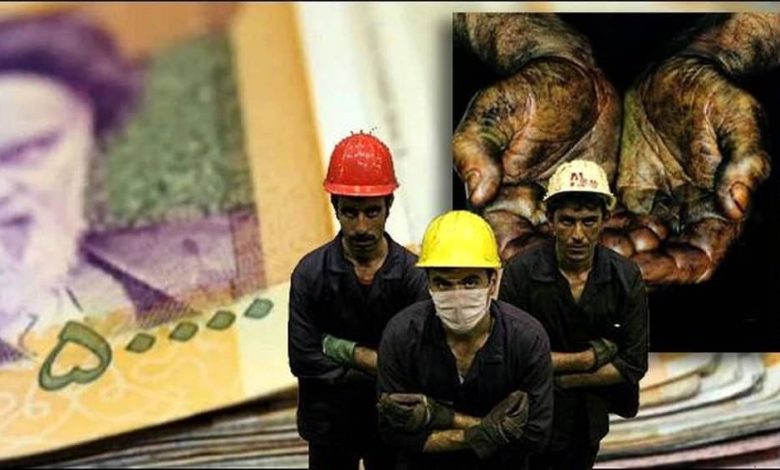Iranian Workers Struggle as Regime Fails to Adjust Salaries with Inflation

Iran-workers-plight-NCRI-1
Written by
Farid Mahoutchi
The Iranian regime made much fanfare about raising workers’ salaries by 27% at the start of the Persian New Year in March. Although considered an ineffective salary raise due to the country’s skyrocketing inflation, authorities have refused to fulfill their own promises.
According to the state-run Tejarat News website on November 13, 2022, “The absolute poverty line for a family of two living in Tehran is 320 million tomans,” and “150 million rials for a family of two living in the city’s outskirts.”
The salary of 14 million workers is roughly 40 million rials; even if the authorities increase it by 27%, it will be around 50 million rials. Meanwhile, the country’s inflation hovers above 40%.
“The 27% salary raise for workers is adopted, but their meager earnings stay behind the ever-growing inflation. So, they cannot make a living,” the state-run Tejarat News wrote on March 26.
“The unbridled inflation deprives workers of having a decent life. The workers’ salary is always below the poverty line. Even if they earn 100 million rials, which wouldn’t help them make a living, they should pay taxes, leaving them penniless against the high prices of consumer goods,” the outlet added.
In other words, not only has the regime refused to increase workers’ salaries, but it has dug its hands deeper into people’s pockets.
On March 21, the state-run Eghtesad News website quoted Ali Babaei Karnami, president of the Parliament’s Labor Commission, acknowledging that “The decision of the Supreme Labor Council to increase the minimum wage of workers by 27% is not per inflation rate and the households’ livelihood.”
This very low salary raise contradicts the regime’s own Labor Law. “According to paragraphs 1 and 2 of Article 41 of the Labor Law, the cost of a family of three must be covered by the minimum salary,” wrote the state-run IMNA News on April 13.
“According to this article: ‘The minimum wage of workers is determined according to the inflation percentage announced by the Central Bank of the Islamic Republic of Iran,’” the outlet writes, adding, “The government has announced two rates of 47.7% and 43.7% as general inflation and 63% as point-to-point inflation. Meanwhile, the inflation rate calculated to increase workers’ salaries is 27-28%, which is not in accordance with real inflation.”
Iran: Workers Can’t Afford a Food Basket
In addition to inflation, the prices of consumer goods continue to skyrocket, preventing Iranian workers from fulfilling their basic needs. “The prices of basic food items have increased since the beginning of the year. For example, the price of each kilo of poultry, which was around 600,000 to 700,000 rials last year, has now reached 840,000 rials. Taxi and bus fares in Tehran have increased by an average of 40%,” the state-run Setar-e Sobh newspaper wrote on April 15.
Yet, Ebrahim Raisi’s government has refused to adopt the 27% salary raise, as the regime has other priorities than people’s well-being, such as funding its terrorist proxies, or as it calls them, the “axis of resistance.”
“We declare boldly and publicly that the system insists on supporting the axis of resistance in the region, and we wouldn’t take a step back in doing so,” Raisi boasted on April 14.
Iranians, particularly workers, have long understood that the regime and its illicit activities are the reason for the country’s financial calamity. The ongoing protests and strikes by Iranian workers are a testament to this fact, and the popular slogan of Iranians “Poverty, corruption, high prices, we will continue until regime change” shows what they consider a solution to their problems.
Rather than negotiating with the ruling theocracy and offering incentives that would only help it fund terrorism and oppression, the global community should support the Iranian people’s call for regime change and intensify pressure on the ruling regime.

